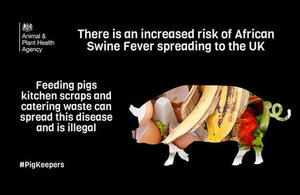African swine fever risk reminder
Pig keepers must not feed kitchen or catering waste to their pigs to help prevent the spread of African swine fever to the UK.

Pig scraps infographic
Read the guidance on how to spot and report African swine fever for the latest information.
African swine fever (ASF) is a highly contagious viral disease of pigs which is currently spreading in eastern and central Europe and has recently been found in China. The virus does not affect people but severe strains of the virus are often fatal to pigs of any age.
If the disease were to reach the UK it would have a devastating effect on our export market and would also mean the humane culling of pigs on infected premises to prevent further spread.
What you should do
If you keep pigs, you must not feed catering waste of any description, or domestic food waste, to your pigs. It is illegal to do so. This is because of the risk of spreading disease.
This includes food from vegetarian kitchens, as there is still a risk of cross contamination from products of animal origin such as milk.
This ban on feeding food waste also helps to protect the UK from diseases such as foot and mouth disease.
Don’t feed:
- Food scraps and catering waste from any restaurant or commercial kitchen (including vegan kitchens) as this is illegal.
- Domestic kitchen waste or scraps.
- Raw, partially cooked or fully cooked meat and fish (including shellfish).
- Dog and cat food.
Instead feed:
-
Specially formulated commercial pig feed as a safe and easy way to give your pigs a balanced diet.
-
Fruit and vegetable material that has never entered a kitchen and which has not come into contact with material of animal origin.
If you are ever worried about the health of your pigs consult your veterinary surgeon immediately.
How the disease spreads
The biggest risk of the disease entering the UK’s pig population is by pigs eating infected pork or pork products derived from infected pigs or wild boar. The ASF virus can survive for months in smoked, dried and cured meats, and in frozen meat. The greatest risk is from meat products brought into the UK from affected countries as personal imports since commercial trade of such products is not permitted from ASF restricted areas.
It also survives in pig faeces and in the blood of infected pigs or wild boar. The virus can therefore be spread on vehicles, equipment, clothing and boots contaminated by infected pigs or wild boar. As a result, farm staff whose homes are in ASF-affected areas in Europe, and people returning to the UK from holidays or hunting expeditions could unknowingly bring back infection. If these people also happen to keep pigs, or work on pig farms, they could pass that contamination on to their pigs and introduce disease, but there are some straightforward actions they can take to prevent introduction.
Practise good biosecurity
- Use dedicated clothing and boots for you and anyone coming onto your premises.
- Prevent vehicles or equipment from coming on to your premises unless cleaned and disinfected first.
- Ensure that people who look after or visit your pigs understand the disease risk of bringing back meat products and in particular wild boar meat or pork/pork products from affected countries. Trade of pork from affected areas in these countries is illegal.
- Don’t bring meat products onto the farm to avoid accidental access to pigs.
Latest situation in Europe
African swine fever was first detected in EU Member States in 2014. Since then, the disease has been spreading in parts of eastern and central Europe. It has been reported in the Baltic States, Poland, Romania, Moldova, the Czech Republic, Hungary, Ukraine and Russia. The presence of the disease in both commercial and backyard pigs in continental Europe means that there is an increased risk of introduction of African swine fever to pigs in the UK. It has also recently been detected in China. You can find out more in our assessments of the risk.
Further information
See more information about African swine fever and how to spot it and advice and posters to download from AHDB Pork.
If you suspect African swine fever you should notify the Animal and Plant Health Agency immediately.
EU-wide animal by-product legislation states that feeding farmed animals with catering waste or feed material containing, or derived from, catering waste is illegal. Doing so can result in prosecution.
For information about biosecurity see controlling disease in farm animals.
For a practical guide on ASF, please see the European Food Safety Authority’s (EFSA’s) video.
Updates to this page
-
Link to EFSA's practical video guide to African swine fever added.
-
First published.